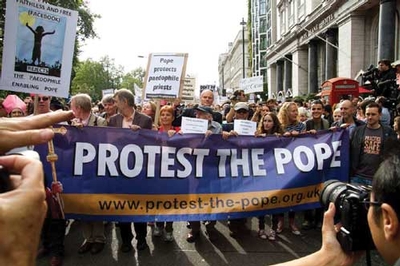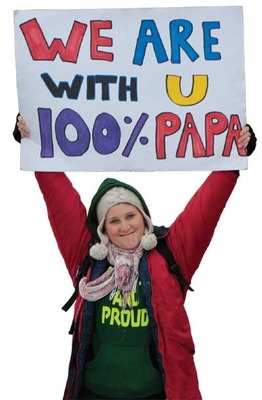Walking through Hyde Park with friends the morning after the Pope’s prayer vigil, a large fenced-off area and huge Glastonbury-style stage frustrating our efforts to play football, it was clear that London had played host to a religious rock star. Except that, Marilyn Manson aside, most rock stars don’t divide public opinion quite so deeply, or have quite such expensive shoes, as Benedict XVI. Reviews were mixed. While Catholics queued up to declare the Papal Visit a triumph – “he came, he saw, he conquered” crowed Catholic weekly The Tablet – opponents suggested it had been a PR disaster. National Secular Society president Terry Sanderson told the BBC, “The Pope may have unleashed a movement for a legal secularisation in this country that he will come to regret.”
 As soon as the visit was announced in February it was clear that it was going to be controversial. The British Humanist Association, along with the NSS, Outrage! and many other secular groups, convened the Protest the Pope coalition, launched a website and organised a series of meetings and events. In the weeks before Benedict’s arrival the BHA offices (we share the same building) were a hive of activity; the volunteers churning out placards and pink paper mitres emblazoned with “Nope Pope” were outnumbered by the film and radio crews recording cutaways and mini interviews for their news shows. A Protest the Pope debate at Conway Hall at the start of September saw AC Grayling and Peter Tatchell clash with Catholic speakers Austen Ivereigh and Father Christopher Jamison on the question of whether the Pope merited a state visit, with a raucous secularist crowd shouting down the Catholics. The stage was set for a bruising and bad-tempered encounter.
As soon as the visit was announced in February it was clear that it was going to be controversial. The British Humanist Association, along with the NSS, Outrage! and many other secular groups, convened the Protest the Pope coalition, launched a website and organised a series of meetings and events. In the weeks before Benedict’s arrival the BHA offices (we share the same building) were a hive of activity; the volunteers churning out placards and pink paper mitres emblazoned with “Nope Pope” were outnumbered by the film and radio crews recording cutaways and mini interviews for their news shows. A Protest the Pope debate at Conway Hall at the start of September saw AC Grayling and Peter Tatchell clash with Catholic speakers Austen Ivereigh and Father Christopher Jamison on the question of whether the Pope merited a state visit, with a raucous secularist crowd shouting down the Catholics. The stage was set for a bruising and bad-tempered encounter.
How would the Vatican, long the champions of Europe, cope with the early pressure? They did not disappoint. Indeed, the fightback started even before the Pope’s plane (dubbed Prayer Force One by one online wag) landed. On the eve of Benedict’s arrival we learned that one of his top advisers, Cardinal Walter Kasper, had been dropped from the tour, after telling a German magazine that landing in the UK feels like arriving in a “third world country” dominated by “a new and aggressive atheism”. While some saw this as a coded attack on British multiculturalism, others suggested it was merely a comment on the quality of the coffee and train services from Heathrow. In any event Kasper was benched and no one swallowed the Vatican’s line that it was due to a bout of gout.
When the Holy Father himself finally arrived in Edinburgh on Thursday 16 September, he wasted no time in getting stuck in. In his first public engagement at the Queen’s Holyroodhouse residence, he reminded us that, in remembering our heroic stand against the “Nazi tyranny” which, lest we forget, “wished to eradicate God from Society”, and reflecting on the “the sobering lessons of the atheist extremism of the 20th century”, we should “never forget how the exclusion of God, religion and virtue from public life leads ultimately to a truncated vision of man and of society.” Had the Pope just compared non-believers to Nazis? Online atheists swung into action and within minutes the BHA issued a press release, denouncing the Pope’s “terrible libel”. More sober commentators merely pointed out that if you had served time in the Hitler Youth – even if you were forced through no fault of your own – you might not be inclined to be the first person to mention the Nazis.
There followed a period of close reading worthy of a seminary, as disputants pored over his speech. Had the Pope really compared atheists to fascists? Not according to Andrew Brown, the Guardian’s online Belief editor, who wrote that “Pope Benedict XVI was talking about the Nazis, not Richard Dawkins”, simply expressing his view that “a nation that turns away from God entirely has nothing to keep it from treating people as disposable means, rather than ends in themselves”. And was this really, after all, such a surprising thing to say if you happened to be a Pope?
Meanwhile the great and the good queued up to get some of that Vatican fairy dust. Well-known admirers who snuggled up to the Pontiff as he travelled south to London included Rowan Williams, former Manchester United player Brian Kidd, the Queen, Susan Boyle, Nick Clegg and Andy Akinwolere, off Blue Peter. At every step the TV news provided the sort of fawning hush-toned coverage usually reserved for royal weddings or funerals. More than once it was referred to as a “Diana moment”, but in reality the Popemobile never received so much as a scratch and, though some people were rather unhappy about the visit, irrational outpourings of grief were largely absent. The NSS accused the BBC of acting as “as the Pope’s propaganda arm” on account of its inadequate coverage of the protest movement, while leading Catholics accused it of being a secular propaganda arm for its excessive coverage of the protest movement. One hundred and seventy people complained to the BBC about its pro-Benedict bias. Two hundred complained that it was biased against him.
 On Friday His Holiness made a historic address in Westminster Hall, scene of the trial of the Catholic martyr Thomas More and the heart of a post-Reformation establishment that for centuries excluded Catholics from public life. If he had seemed hostile to secularism previously, in Westminster he offered an olive branch. “The world of reason,” he told the Hall, “and the world of faith … need one another and should not be afraid to enter into a profound and ongoing dialogue.” He immediately undermined his commitment to reason by recycling the hoary old myth that atheists want to ban Christmas – “there are those who argue that the public celebration of festivals such as Christmas should be discouraged” – allowing the Sun to run with the headline “Pope: Don’t let the PC brigade ruin Christmas” and declare that “Benedict XVI let rip at the politically correct knuckleheads”.
On Friday His Holiness made a historic address in Westminster Hall, scene of the trial of the Catholic martyr Thomas More and the heart of a post-Reformation establishment that for centuries excluded Catholics from public life. If he had seemed hostile to secularism previously, in Westminster he offered an olive branch. “The world of reason,” he told the Hall, “and the world of faith … need one another and should not be afraid to enter into a profound and ongoing dialogue.” He immediately undermined his commitment to reason by recycling the hoary old myth that atheists want to ban Christmas – “there are those who argue that the public celebration of festivals such as Christmas should be discouraged” – allowing the Sun to run with the headline “Pope: Don’t let the PC brigade ruin Christmas” and declare that “Benedict XVI let rip at the politically correct knuckleheads”.
With the Pope making history on Friday, his opponents set about making their own on Saturday, holding the largest ever public demonstration against a Pontiff. Estimates of numbers varied, as they usually do. The police had it at 12,000, organisers claimed 20,000, opponents insisted it was less than half that. Either way, a large and good-natured crowd turned out to march from Piccadilly to Downing Street. The focus was firmly on the issue of a taxpayer-funded state visit and the alleged crimes of the Vatican – child abuse cover ups, condoms and AIDS in Africa, homophobia – meaning any accusations of anti-Catholicism were well off the mark (a relief for the organisers, who must have had their concerns after Ian Paisley held his own Protest the Pope rally in Edinburgh). Energy and imagination had clearly gone into many of the placards, like “Get your rosaries off my ovaries”, “Abstinence makes the church grow fondlers” and “No sects please, we’re British”. Others hit a sour, shouty note – “Fuck off back to the 14th century”, “Arrest the paedo Pope”, “Despicable twisted vile hypocrite”.
Inevitably it was Richard Dawkins who was charged with delivering the coup de grace in the game of National Socialist tit-for-tat that had been bubbling since day one. His speech focused on the notion that Hitler was a baptised Catholic and cited several speeches he had made that mentioned God. The aim was not to suggest that it was this that made him such a monster, but to argue that if the Pope wanted to include in his head-count of church members all the people who had been baptised as Catholics, he had to take Hitler too. Or, if not, he had to count only those who actually attend church, which would mean a huge drop in numbers for his team. It’s hard to fault the logic but, with Dawkins also declaring the Pope to be “an enemy of humanity”, it hardly served to dispel the notion of aggressive atheism. Predictably his supporters thought it was a great speech – the YouTube video whizzed around the internet – while others were unconvinced and put off.
In his farewell address to the Pontiff, David Cameron, with his recent experience of bringing warring factions together, suggested that a lot could be gained if we all just got along: “People do not have to share a religious faith,” he told the Pope, “or agree with religion on everything to see the benefit of asking the searching questions that you, your Holiness, have posed to us.” As the protest wound its way through Mayfair, groups of pilgrims passed by on their way to the Pope’s prayer vigil in Hyde Park, their bewildered faces appearing to sum up the national conversation the visit generated in Britain. Protestors and pilgrims passed without talking, each probably glancing scornfully at the banners of the other side. The Papal Visit was an opportunity for them to discuss their positions, but instead they were drowned out by the trading of Nazi slurs and the oleaginous tones of Nicholas Witchell.
When the Pope flew back to Rome on Sunday night, fresh from beatifying Cardinal Newman in Birmingham, both supporters and opponents proclaimed the visit a resounding success. Catholic commentators spoke of a “Benedict bounce”, the start of a new golden age for Catholicism in Britain, and Conservative minister Baroness Warsi announced that we now have a government that will “do God”. Meanwhile the NSS declared that in the contest between secularism and religion the “battle lines are being drawn”. For the middle ground in all this, bizarrely, we could do worse than look to the words of the headline act. The reasonable dialogue between faith and reason the Pope called for in Westminster seems a long way off but, no matter who proposes it, perhaps it wouldn’t be a bad idea.

